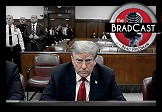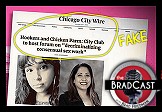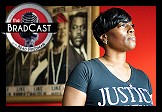Hallelujah!
Voters with disabilities are finally beginning to speak out against the use of Direct Recording Electronic (DRE, often known as "touch-screen") voting systems!
After years of DRE supporters, and indeed the Help America Vote Act (HAVA) of 2002, using the canard that blind and disabled voters must use DREs to vote privately and independently, a number of leaders in the disabilities community are speaking out against their having been used as a wedge to force the nationwide implementation of such disenfranchising, dangerous voting systems.
Two different landmark statements on the issue have now been released, The BRAD BLOG has learned. One statement [PDF] released last week by the Disability Law Center and the ACLU speaks in support of the decision by the Massachusetts Secretary of State to approve the use of ballot marking devices, as opposed to DREs, for use by the state's disabled voters.
The second, released today to The BRAD BLOG in advance of Congressional subcommittee hearings tomorrow, is signed so far by more than 20 leaders of the blind and disabled communities and calls for "an immediate ban" on DRE voting systems. Like the release from the Disability Law Center, the newly released statement crushes the long-overused myth that such unsecure, disenfranchising, failed technology is required for disabled access to private, independent voting. (The complete statement is posted at the end of this item.)
"Providing secure voting machines for voters with disabilities is part and parcel of protecting [disabilities voters'] rights to equal access to the ballot and to having their votes reliably counted," said Stanley J. Eicher, Executive Director of the Disability Law Center in their March 5th statement.
"The decision by the Secretary shows that it is both possible and essential to build common ground between the disability rights community and the growing number of citizens who are concerned that many of the proposed new technologies are subject to tampering and error," said Eichner, adding notably, "We must debunk the myth that we have to choose between accessible voting and verifiable voting. Democracy requires that we have both."
The brief but no-uncertain-terms statement today from the disabilities advocates calls for a nationwide ban on the use of DRE technology.
"Electronic ballot systems such as the direct record electronic (DRE) machines...now in use," the statement reads, "have quickly proven to be neither fully accessible to all voters nor secure and accurate methods of recording, tallying, and reporting votes. While the goal of private voting has been achieved by some voters, this has often been without meaningful assurance that our votes have been counted as cast."
The disabilities leaders go on to point out that verification of ballots and the accuracy of their tabulation need not be sacrificed for accessibility or privacy. A similar point was at the heart of a report recently released by one of the letter's authors, blind technology expert Noel H. Runyan. His report, published simultaneously by both Demos and VoterAction.org, concerns the failure of DRE systems to meet both HAVA requirements and the accessibility and verification needs of disabled voters.
The statement further describes DRE electronic balloting systems as "inappropriate for use" and calls on "all disability rights groups, other civil rights groups, election protection groups, and elected officials to recognize the necessity for an immediate ban" on such dangerous, unreliable, and unsecure technology:
...
We leaders and members of the disability rights community assert that neither accessibility for all voters nor the security of the vote can be sacrificed for the sake of the other. Fortunately, true accessibility and election security can both be achieved; there is no inherent incompatibility between voting system accessibility and security.
We recognize that electronic ballot systems are inappropriate for use, because these systems make it impossible for voters to verify that their votes will be counted as cast. We call upon all disability rights groups, other civil rights groups, election protection groups, and elected officials to recognize the necessity for an immediate ban on any voting system that fails to meet the twin requirements of full accessibility and election security.
This new and most welcome statement from this particular community is in stark contrast to the only other major voices previously allowed to testify before Congress on such matters, such as the National Federal for the Blind (NFB) and Jim Dickson of the American Association of People with Disabilities (AAPD).
Despite both of those groups having received large donations from voting machine companies such as Diebold, Inc., both have been granted extraordinary access to Congress and have leveraged that access to call for the use of DRE systems for their communities (and even paperless ones at that).
The NFB received $1 million from Diebold, and Jim Dickson's group, although he lied to The BRAD BLOG about it previously, received at least $16,000 from the voting machine vendors, according to the New York Times.
We are happy to see new, uncompromised voices from this important community finally speaking up and adding their concerns to others such as Johns Hopkins computer scientist Avi Rubin, who testified last week that DRE systems, with or without a so-called "voter verified paper audit trail," are "not a reasonable voting system."
It would be nice if Runyan and some of the other signatories were invited to testify before Congress as well, and equally nice if Congress held hearings devoted to the issue of the safety, accuracy and accessibility of DRE systems before moving forward on Election Reform bills such as Rep. Rush Holt's HR811, which unfortunately falls short of banning DRE technology in American democracy.
NOTE: We will be Guest Hosting Cynthia Black's Action Point this Sunday 3/18/07 @ 3pm ET (12noon PT) on Phoenix's Air America/NovaM affiliate 1480 KPHX. We hope to have Runyan as one of our featured guests.
UPDATE: Here is my interview on on Action Point with Noel Runyan. MP3 appx. 30 minutes
The complete statement from the disabilities leaders, including Runyan and many others, follow in full below...
Voters with disabilities, sensory impairments, and special language needs have long been disenfranchised in large numbers as a result of lack of access to the voting process. For many of us, the passage of the Help America Vote Act of 2002 held tremendous hope and promise for secure and reliable voting, a guarantee that every voter would have access to the voting process.
Electronic ballot systems such as the direct record electronic (DRE) machines (formerly called "touch screens") now in use have quickly proven to be neither fully accessible to all voters nor secure and accurate methods of recording, tallying, and reporting votes. While the goal of private voting has been achieved by some voters, this has often been without meaningful assurance that our votes have been counted as cast. Additionally, many other voters have been disappointed and frustrated because we have not been able to vote privately and independently as we had hoped and as voting-system vendors had promised.
It is now clear that in order to guarantee reliability and security in our elections, it is necessary for the voter to be able to truly verify the accuracy of his or her ballot--the ballot that will actually be counted. The only voting systems that permit truly accessible verification of the paper ballot are ballot marking devices. These non-tabulating devices, either electronic or non-electronic, assist the voter in marking and verifying votes on paper ballots that can either be optically scanned or hand-counted. (Some DRE voting machines that have already been purchased may be adapted to be used as acceptable ballot marking devices, assuming their accessibility can be preserved or improved.)
The technology for inexpensively providing good accessibility to voting systems has been commonly available for more than a decade, and it can and should immediately be required for and applied to all modern voting systems.
This is clearly illustrated by the report "Improving Access to Voting: A report on the Technology for Accessible Voting Systems," by Noel Runyan, (WORD | PDF | large-print | braille) posted at VoterAction.org and Demos.org. Design of new systems must include, from the beginning, accommodations to allow private and independent voting by individuals with a broad range of access needs. These systems must simultaneously ensure secure elections.
We leaders and members of the disability rights community assert that neither accessibility for all voters nor the security of the vote can be sacrificed for the sake of the other. Fortunately, true accessibility and election security can both be achieved; there is no inherent incompatibility between voting system accessibility and security.
We recognize that electronic ballot systems are inappropriate for use, because these systems make it impossible for voters to verify that their votes will be counted as cast. We call upon all disability rights groups, other civil rights groups, election protection groups, and elected officials to recognize the necessity for an immediate ban on any voting system that fails to meet the twin requirements of full accessibility and election security.
List of signatories as of 3/14/07 (affiliations are listed for identification purposes only):
Noel Runyan, voting access technology engineer and author of "Improving Access to Voting"
Roger Petersen, member, Santa Clara County Advisory Commission for Persons with Disabilities and Santa Clara County Voter Access Advisory Committee
Bernice Kandarian, President, Council of Citizens with Low Vision International
Robert Kerr, ACB Maryland
Shawn Casey O'Brien, KPFK-FM in Los Angeles, and California Secretary of State's Ad Hoc Touch Screen Task Force member
Suzanne Erb, Chairperson of the Philadelphia Mayor's Commission on Disabilities
Mike Keithley
A. J. Devies, Past President, Handicapped Adults of Volusia County (HAVOC); Charter Member, Daytona Beach Mayor's Alliance for Persons with Disabilities; Disability Consultant and Board Member, Florida Fair Elections Coalition
Marta Russell, independent journalist and author
Judith K. Barnes, Life Member, Council of Citizens With Low Vision; Former President, Silicon Valley Council of the Blind
George Moore, Accessibility Advocate, Californians for Disability Rights
Mike May, President, Sendero Group
Margaret Keith, VP, Monterey Co. Chapter, Californians for Disability Rights
Adrienne Lauby, Host/Producer, Pushing Limits, disability program on KPFA fm
David Andrews
Jean Stewart, Writer
Ruthanne Shpiner, Pushing Limits Radio 94.1 FM, Northern California ADAPT
Mike Godino, President, American Council of the Blind of New York, Systems Advocate, Suffolk Independent Living Organization
Louis Herrera
Dawn Wilcox, BSN RN, Past President Silicon Valley Council of the Blind, Board member CCCLV
Barry Scheur, Scheur & Associates
Tom Fowle, Rehabilitation Engineer, The Smith-Kettlewell Rehabilitation Engineering Research Center, San Francisco
DEMAND A BAN ON DRE/TOUCH-SCREEN VOTING!
- Email Congress!
- Call you members!
See www.BradBlog.com/Holt for more details, coverage, talking points & information on all of the above!


 Bad Climate News for Home, Car Owners; Good Labor News for Workers in the South: 'BradCast' 4/18/24
Bad Climate News for Home, Car Owners; Good Labor News for Workers in the South: 'BradCast' 4/18/24 'Green News Report' 4/18/24
'Green News Report' 4/18/24
 SCOTUS Suddenly Worried About Overcriminalization ... for J6 Insurrectionists: 'BradCast' 4/17/24
SCOTUS Suddenly Worried About Overcriminalization ... for J6 Insurrectionists: 'BradCast' 4/17/24 'Trump Media' Plummeting, MAGA Buyers Losing Life Savings: 'BradCast' 4/16/24
'Trump Media' Plummeting, MAGA Buyers Losing Life Savings: 'BradCast' 4/16/24 'Green News Report' 4/16/24
'Green News Report' 4/16/24 Trump's First Criminal Trial, for Cheating in 2016, Begins in NY: 'BradCast' 4/15/24
Trump's First Criminal Trial, for Cheating in 2016, Begins in NY: 'BradCast' 4/15/24 Sunday 'Party Like It's 1864' Toons
Sunday 'Party Like It's 1864' Toons Biden Closes 'Gun Show Loophole'; Repubs Turn Desperate: 'BradCast' 4/11/24
Biden Closes 'Gun Show Loophole'; Repubs Turn Desperate: 'BradCast' 4/11/24  'Green News Report' 4/11/24
'Green News Report' 4/11/24 'Pink Slime': Fake 'Local News' Sites Proliferating in Advance of Election: 'BradCast' 4/10/24
'Pink Slime': Fake 'Local News' Sites Proliferating in Advance of Election: 'BradCast' 4/10/24 Dirty Tricks and the Dirtiest Candidate Of All Time: 'BradCast' 4/9/24
Dirty Tricks and the Dirtiest Candidate Of All Time: 'BradCast' 4/9/24 'Green News Report' 4/9/24
'Green News Report' 4/9/24 'Titanic Law' Reform Just Tip of Iceberg in Quest for Key Bridge Accountability: 'BradCast' 4/8/24
'Titanic Law' Reform Just Tip of Iceberg in Quest for Key Bridge Accountability: 'BradCast' 4/8/24 Sunday 'Dark Days Indeed' Toons
Sunday 'Dark Days Indeed' Toons Trump's Very Bad Day in Court(s), Other Good (& Less Good) News: 'BradCast' 4/4
Trump's Very Bad Day in Court(s), Other Good (& Less Good) News: 'BradCast' 4/4 'Green News Report' 4/4/24
'Green News Report' 4/4/24 WI Supremes May Restore Drop-Box Voting
WI Supremes May Restore Drop-Box Voting WI Voters Approve Election Crippling Ballot Measures: 'BradCast' 4/3/24
WI Voters Approve Election Crippling Ballot Measures: 'BradCast' 4/3/24  Politico's Josh Gerstein Owes a Retraction
Politico's Josh Gerstein Owes a Retraction More GOP Election Fraud; Overdue Justice for Crystal Mason: 'BradCast' 4/2/24
More GOP Election Fraud; Overdue Justice for Crystal Mason: 'BradCast' 4/2/24 Last Week Today with OG Bloggers:
Last Week Today with OG Bloggers: It's Up to You, New York: 'BradCast' 3/21/24
It's Up to You, New York: 'BradCast' 3/21/24 'It All Comes Down to Brett and Amy': 'BradCast' 3/20/24
'It All Comes Down to Brett and Amy': 'BradCast' 3/20/24 American 'Bloodbath': 'BradCast' 3/19/24
American 'Bloodbath': 'BradCast' 3/19/24
 VA GOP VOTER REG FRAUDSTER OFF HOOK
VA GOP VOTER REG FRAUDSTER OFF HOOK Criminal GOP Voter Registration Fraud Probe Expanding in VA
Criminal GOP Voter Registration Fraud Probe Expanding in VA DOJ PROBE SOUGHT AFTER VA ARREST
DOJ PROBE SOUGHT AFTER VA ARREST Arrest in VA: GOP Voter Reg Scandal Widens
Arrest in VA: GOP Voter Reg Scandal Widens ALL TOGETHER: ROVE, SPROUL, KOCHS, RNC
ALL TOGETHER: ROVE, SPROUL, KOCHS, RNC LATimes: RNC's 'Fired' Sproul Working for Repubs in 'as Many as 30 States'
LATimes: RNC's 'Fired' Sproul Working for Repubs in 'as Many as 30 States' 'Fired' Sproul Group 'Cloned', Still Working for Republicans in At Least 10 States
'Fired' Sproul Group 'Cloned', Still Working for Republicans in At Least 10 States FINALLY: FOX ON GOP REG FRAUD SCANDAL
FINALLY: FOX ON GOP REG FRAUD SCANDAL COLORADO FOLLOWS FLORIDA WITH GOP CRIMINAL INVESTIGATION
COLORADO FOLLOWS FLORIDA WITH GOP CRIMINAL INVESTIGATION CRIMINAL PROBE LAUNCHED INTO GOP VOTER REGISTRATION FRAUD SCANDAL IN FL
CRIMINAL PROBE LAUNCHED INTO GOP VOTER REGISTRATION FRAUD SCANDAL IN FL Brad Breaks PA Photo ID & GOP Registration Fraud Scandal News on Hartmann TV
Brad Breaks PA Photo ID & GOP Registration Fraud Scandal News on Hartmann TV  CAUGHT ON TAPE: COORDINATED NATIONWIDE GOP VOTER REG SCAM
CAUGHT ON TAPE: COORDINATED NATIONWIDE GOP VOTER REG SCAM CRIMINAL ELECTION FRAUD COMPLAINT FILED AGAINST GOP 'FRAUD' FIRM
CRIMINAL ELECTION FRAUD COMPLAINT FILED AGAINST GOP 'FRAUD' FIRM RICK SCOTT GETS ROLLED IN GOP REGISTRATION FRAUD SCANDAL
RICK SCOTT GETS ROLLED IN GOP REGISTRATION FRAUD SCANDAL VIDEO: Brad Breaks GOP Reg Fraud Scandal on Hartmann TV
VIDEO: Brad Breaks GOP Reg Fraud Scandal on Hartmann TV RNC FIRES NATIONAL VOTER REGISTRATION FIRM FOR FRAUD
RNC FIRES NATIONAL VOTER REGISTRATION FIRM FOR FRAUD EXCLUSIVE: Intvw w/ FL Official Who First Discovered GOP Reg Fraud
EXCLUSIVE: Intvw w/ FL Official Who First Discovered GOP Reg Fraud GOP REGISTRATION FRAUD FOUND IN FL
GOP REGISTRATION FRAUD FOUND IN FL


































